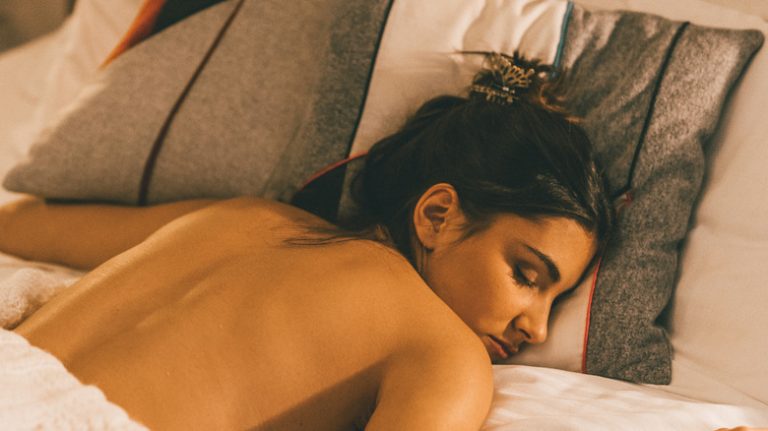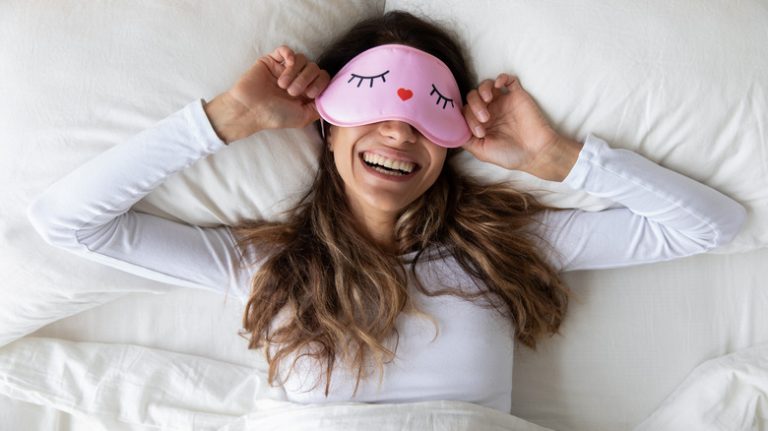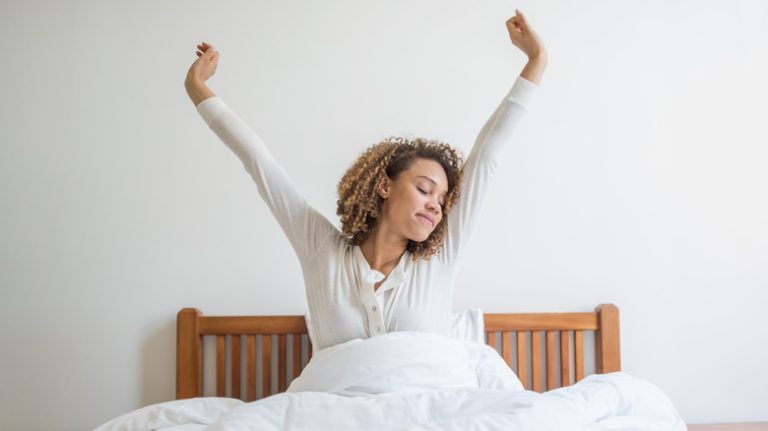Falling asleep can, at times, feel ridiculously impossible. It is completely frustrating when you’re fall-on-your-face exhausted, and yet somehow still find yourself staring at the walls, negotiating with the clock, and counting a seemingly endless flock of sheep.
There are plenty of reasons you might be having trouble drifting off. “If there isn’t anything medically awry, there can be any one of a number of things contributing to your sleep woes,” scientist Yvette d’Entremont wrote in an article for Self. “Excess caffeine, alcohol, or nicotine use; shift work; keeping your devices on in bed; an inconsistent bedtime; irregular sleep patterns (frequent napping or sleeping late); … or even something as simple as an uncomfortable bed can all wreck your sleep.” It could also be stress, anxiety, tummy troubles, or simply temperature fluctuations.
Regardless of the frustrating reasons, you can help expedite the shutting of your eyes with a few simple tricks, techniques, and bedtime routine swaps. Ready to say goodbye to long restless nights for good and nod off ASAP from here on out? These are the tricks you need to try if you can’t fall asleep at night.
If you’re struggling to fall asleep, try a warm shower and a cold room
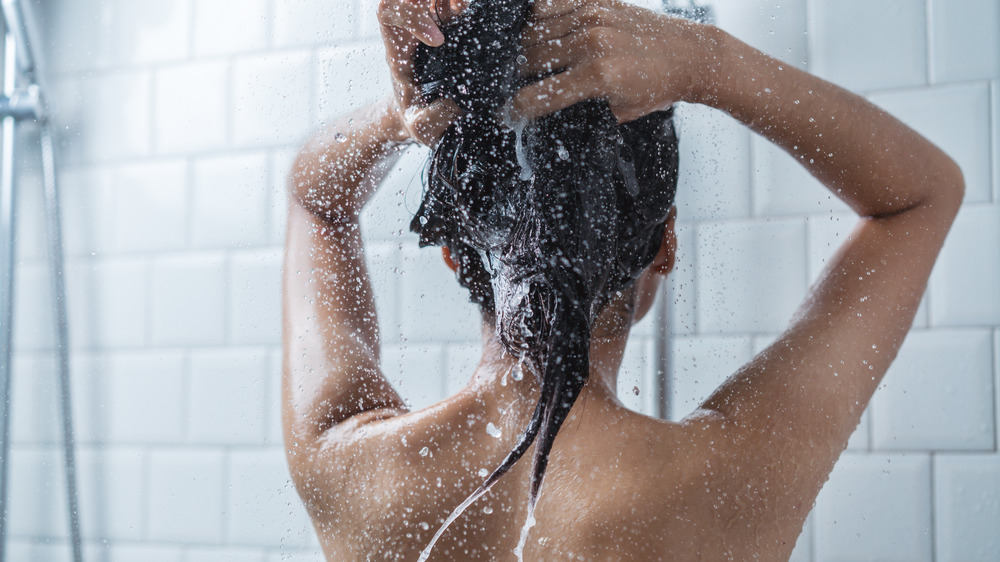
Warm up to cool down to get sleep. Sufficiently confused? As explained by neuroscientist Matthew Walker, you want to decrease your body temperature by two degrees to help with sleep onset latency and improve your overall quality of slumber. To this end, taking a warm shower before bed might seem counterintuitive; but, as it turns out, “for you to get your heat out of the core of your body, you actually need to release that core heat through the outer perimeter surfaces of your body, namely your hands and your feet,” he told NPR. And this is exactly what happens after a warm rinse or soak.
In fact, an analysis published in Sleep Medicine Reviews showed that a warm shower an hour or two before bed can, indeed, help people fall asleep faster and stay asleep longer. While you’re trying to adjust your body’s core temperature, tweak the thermostat as well. But don’t turn the heat up. According to the National Sleep Foundation, the ideal temperature for a good night sleep is 65 degrees — at least for adults. Lowering the temperature in your home can help regulate your body’s natural sleep rhythm making it easier to nod off and stay down.
Try a supplement like melatonin to get good sleep

If you lay awake endlessly staring at the ceiling or find yourself tossing and turning into the wee hours of the night, a supplement may be exactly what you need to get your sleep-and-wake cycle back into functioning gear.
As noted by Men’s Journal, one of the most popularly used sleeping aids is melatonin, a neurohormone that your body naturally makes on its own. Melatonin supplements are especially useful for resetting sleep patterns that have been thrown off by a case of insomnia or acute jet lag. L-Theanine, on the other hand, is a supplement that actively works to calm and soothe your body and mind, making it an ideal option for those who find themselves preoccupied (read: stressed out) before bed. Finally, per Sleep and Biological Rhythms, the supplement glycine promotes REM sleep, helps to stave off daytime fatigue, and works to make your eyelids feel heavy quicker.
Use a weighted blanket to fall asleep faster
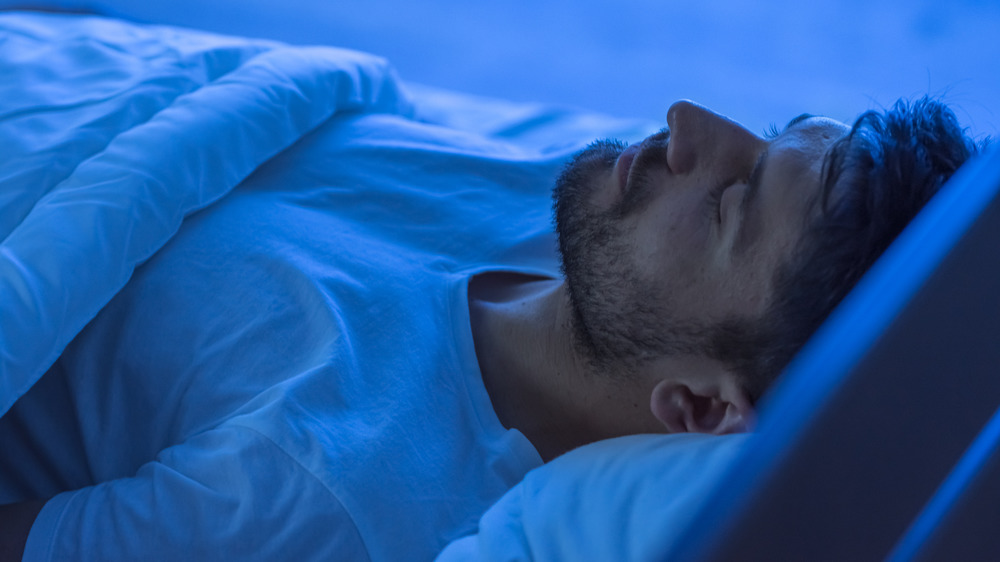
Shutterstock
Want to engulf yourself in sleepiness? Try drifting off under the gentle yet firm pressure of a weighted blanket. Dr. Raj Dasgupta, spokesperson for the American Academy of Sleep Medicine, explained to WebMD just why people swear by the sleep-inducing effects of weighted blankets. “It’s like having the best hug for a long period of time,” he said. What’s more, he claimed that it could be “a good alternative to life-long sedative hypnotic medications (sleeping pills) at night.”
While there are not many studies that definitively link weighted blankets to improved sleep onset latency, early research by a Swedish blanket brand, cited by WebMD, demonstrated that men and women who used these pellet-filled soothers on a nightly basis reported feeling calmer and getting a better night of zzz’s. Ready to give a weighted blanket a try? Experts suggest finding one that is about 10 percent of your body weight (via Healthline).
You’ll have an easier time falling asleep if you embrace a sleep schedule
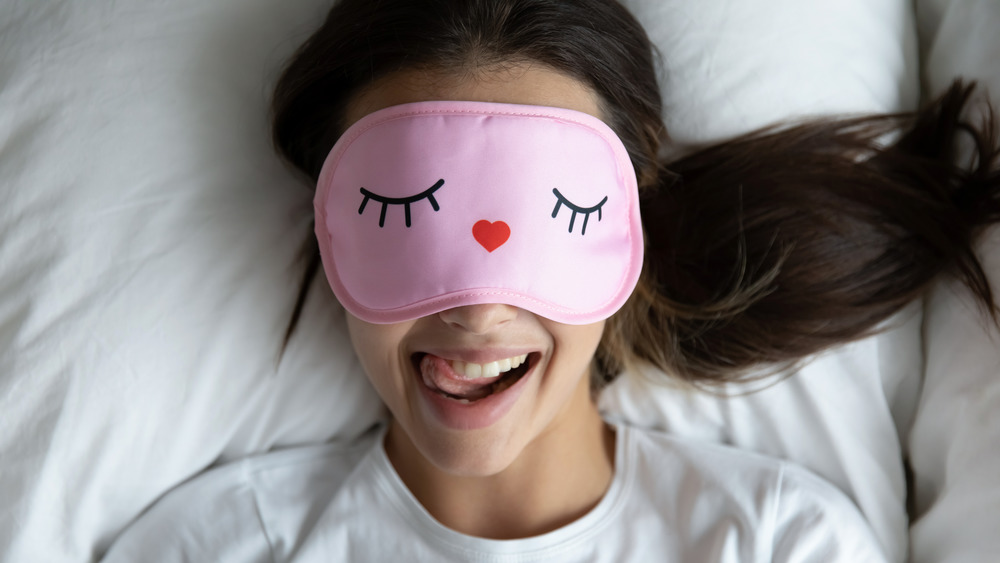
Shutterstock
Your circadian rhythm is your body’s internal clock; it dictates your energy level throughout the day and evening, and helps you naturally feel awake in the morning and tired at night, according to the National Sleep Foundation. But if you have an all-over-the-place routine — whether by choice or circumstance — you could be throwing your rhythm into a total tizzy of confusion. In fact, research out of Örebro University in Sweden found that teenagers who regularly go to bed at all hours and wake at random times suffer the effects of jet lag without the perk of travel (via CBC Radio-Canada).
In order to get to sleep faster, stay asleep longer, and sustain your general motivation throughout the day, you’ll want to welcome routine into your frenzied lifestyle. Go to bed at the same time each evening, and resist the urge to indulge in oversleeping. Set an alarm to rise and shine. As explained by Verywell Health, waking at a consistent time daily will enable you to fall asleep quicker at night and will “build a strong desire for sleep throughout wakefulness.” In short, if you decide to luxuriate in bed, it can actually further fuel your insomnia. Break the cycle and the snooze button habit. Win-win.
Mind your pre-bed eating habits if you want to get decent rest

Shutterstock
If your late-night snacking habit leads to gastrointestinal discomfort in bed, we have to be the ones to state the obvious: Lay off the fatty, greasy, spicy, or heavy foods as your bedtime approaches. What’s more, watch the caffeine in the afternoon and evening hours. Your pre-bed eating patterns could be contributing to your inability to fall asleep (via WebMD).
Fret not, though. If you find yourself needing a little munch before you board the train to Dreamsville, there are plenty of foods you can enjoy that may actually help to satisfy your grumbling tummy and promote a good night of sleep.
As noted by Healthline, almonds boast melatonin and magnesium, both of which can foster quality rest. Similarly, walnuts are a great option loaded with healthy fats. High in protein and tryptophan, a little turkey snack can help induce sleepiness. And chock full of serotonin and antioxidants, kiwi could be the dessert fruit that helps you get your Zzz’s on.
Journaling before bed can you help you fall asleep faster
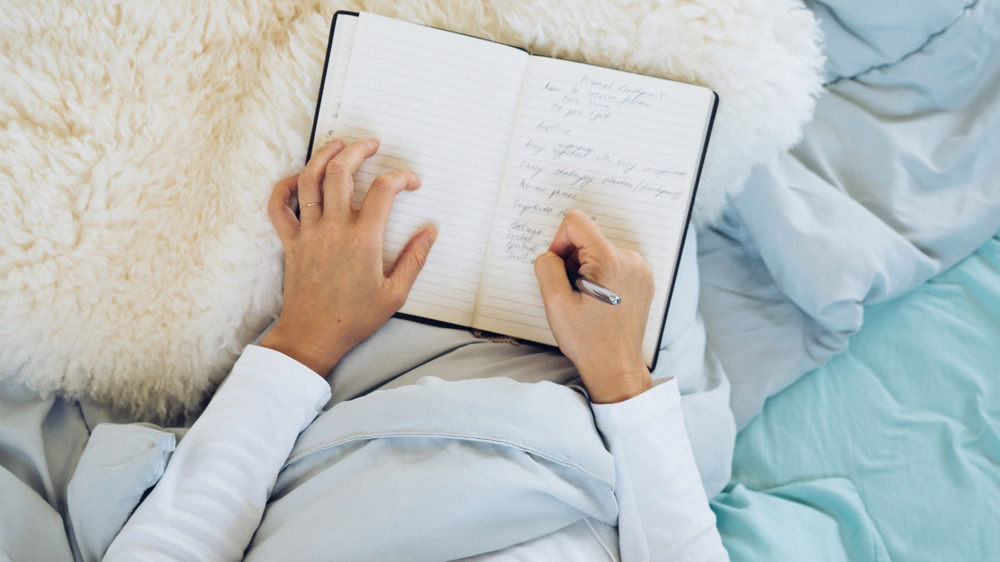
Shutterstock
Have a lot of work taking up mental space? Clear your mind and get it all out — literally — with a pen and paper. As noted by the results of a study published in the Journal of Experimental Psychology, simply drafting a to-do list can help you take a load off and nod off faster.
Lead researcher Dr. Michael K. Scullin explained this phenomenon to Shape, saying, “One of the biggest barriers to falling asleep for people is that we have thoughts circling around in our heads when we turn out the lights. These thought processes work in opposition to relaxing and falling asleep.” Rather than distract yourself, be honest about the things you haven’t yet crossed off your list.
It may sound counterintuitive, but this type of to-do journaling can set you up for sleep success. On the other hand, congratulating yourself with a list of things you did accomplish won’t do the tiring trick. Scullin’s research showed that when people listed the things they achieved during the day, it had little to no positive effect on their sleep onset latency or slumber quality.
Try a relaxing visualization to aid you to sleep
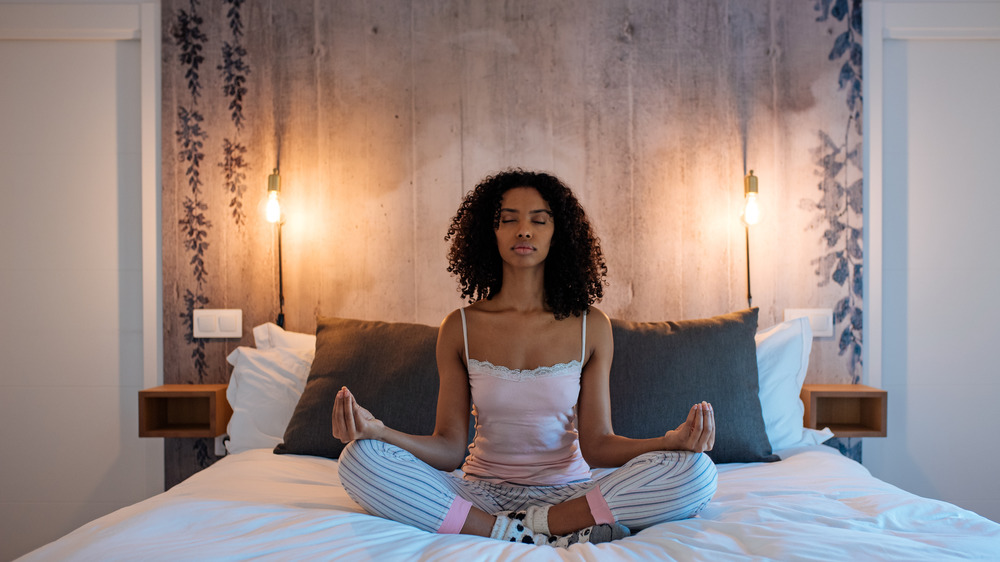
Shutterstock
Meditating can be the key to quieting your mind, soothing your soul, and lulling your exhausted body into a deep sleep. Don’t worry, you do not have to be a master of meditation to achieve your zen-like goals. A simple visualization exercise can put you in the right mental, emotional, and physical place to achieve expedited sleep onset latency, as demonstrated by a research analysis published in Behaviour Research and Therapy.
As recommended by the Sleep Foundation, “Visualize a scene, memory, or story that you find calming … and let go of other thoughts.” It’s important to think of details and take yourself through the visualization slowly and methodically. If an intrusive thought enters your mind “acknowledge it and let it go.” It’s not necessarily difficult, but it takes practice and patience — and you’ll have to work on your ability to filter out distraction. So next time you are having difficulty nodding off, do like Peter Pan and think happy thoughts.
Consider trying some quick acupressure
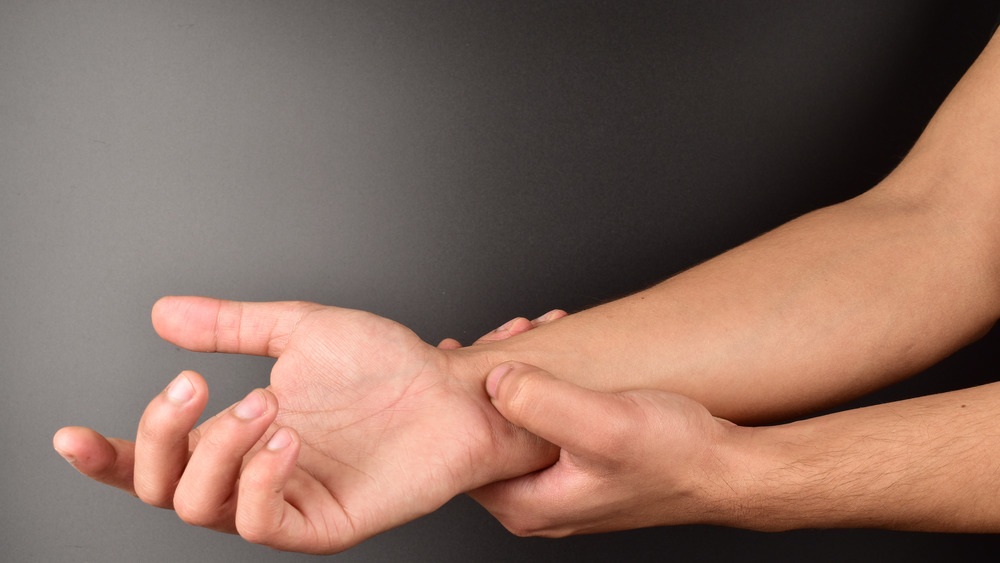
Shutterstock
A full-body massage would be nice before bed. But when that is not an option (and when is it?), hitting a few key pressure points could at least help to relax you and get your body ready to hit the hay. As noted by Medical News Today, acupressure gets its roots from traditional Chinese medicine, and can be used to treat insomnia.
According to acupuncturist Stefanie Dilibero, “People’s bodies and nervous systems are affected by stress in different physical manifestations.” She explained to Well+Good that “acupressure points can be used as a way to target the specific ways in which your body needs balance, and when you are balanced in a way specific to your conditions, you will sleep better.” One key spot to try? The Yin Tang. It is located right between your eyebrows, and pressing your finger into this point can get you the sleep you want (via Medical News Today).
Try these breathing exercises to get adequate rest
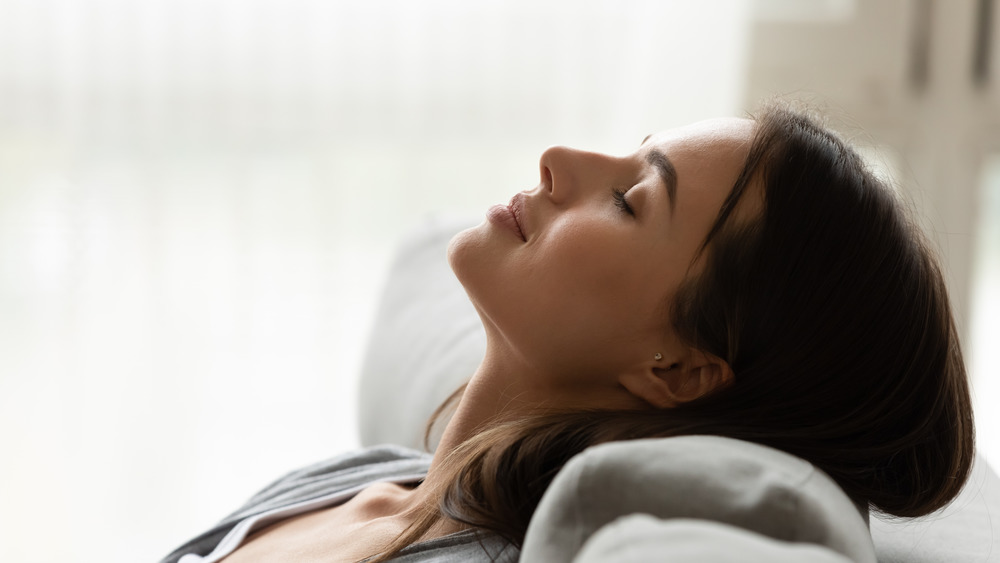
Shutterstock
Breathing deep from your abdomen can help you unwind. If it is anxiety or stress that is keeping you awake at night, slowly practicing your breath work can take the edge off and get you to a calm sleep-ready mental and physical space. As advised by Verywell Mind, simply breathe in from your nose and out with your mouth, trying to avoid shallow short breaths.
Another slightly more strategic but highly effective breathing exercise is the 4-7-8 count. Inhale through your nose counting to four. Hold the breath for a seven count, and then exhale slowly through your mouth for eight seconds, making an audible “whooshing” noise. Repeat this routine three or four times, as advised by Dr. Weil. Similarly, you can try counting your exhales. Count five exhales and then start over beginning at one again. While a simple exercise, it forces you to focus.
A body scan is another great way to release any stress through breathing. Focus on specific parts of your body to find where you may be holding tension. Once you’ve scanned your entire physical self, repeat a relaxing mantra on each exhale (via Verywell Mind).
Aromatherapy could help you in your quest for sleep
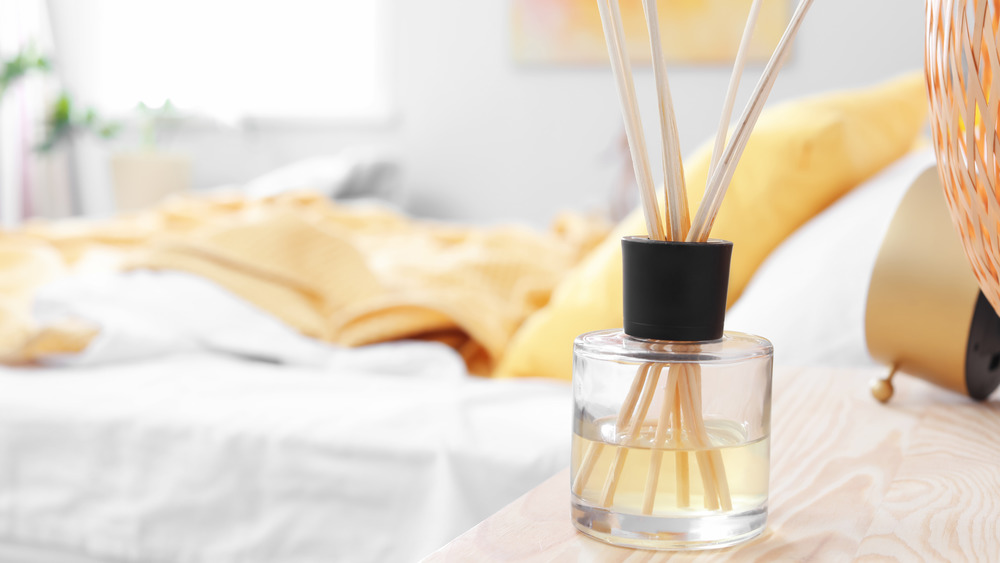
Shutterstock
Breathe in, breathe out — and mellow your mind and body as you lay in bed with the help of an essential oil. According to Byrdie, there are several varieties that not only encourage sound sleep, but also alleviate anxiety and stress and may even have the ability to reduce blood pressure. You can choose to diffuse an oil to fill a room with a soothing aroma, dilute some types and apply with a cotton ball directly on your skin, or even spray a bit on your pillow and blanket.
Bergamot, lavender, and cedarwood, are among some of the oils that are known to have sedative effects (via Verywell Health). Even if you do not find yourself immediately passing out after a few gentle whiffs, a scented oil can, at the very least, set the scene for a relaxing evening ahead. A flickering scented candle can help to create a sleep-promoting ambiance, too — just be sure to blow it out before falling asleep!
Try the military method to get some shut-eye fast
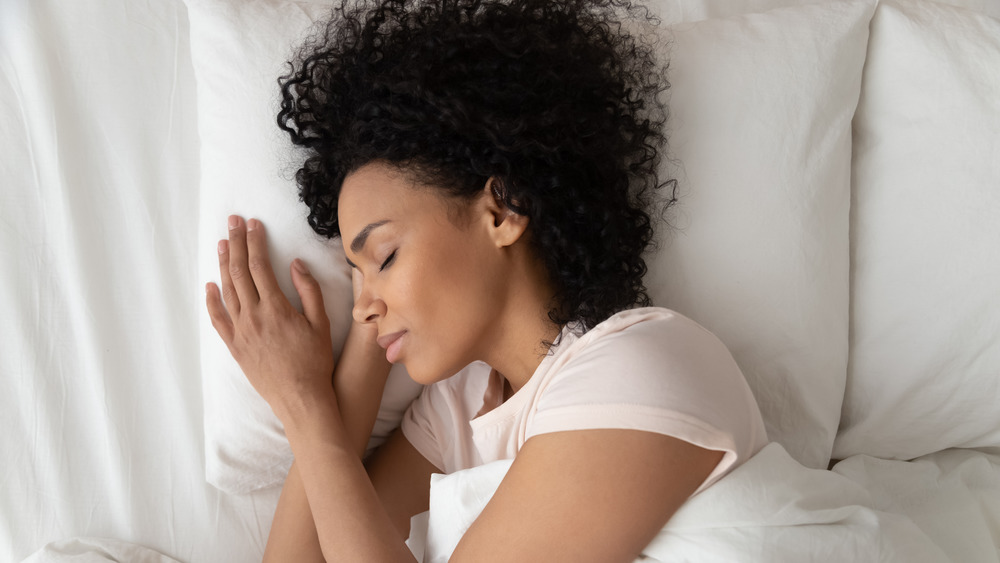
Shutterstock
Everyone requires sufficient sleep, but it’s especially important that those who step into situations with life-or-death consequences get quality rest. During World War II, the military recognized that fighter pilots needed adequate shut-eye so that they’d be able to act efficiently without heightened risk of potentially fatal fatigue-driven mistakes. Thus, the military method of training pilots to fall asleep in two minutes or less was born. As reported by Business Insider, after just six weeks of training, 96 percent of pilots reported being able to nod off, despite gun fire and other major distractions.
So how can you do this at home? Take a resting position. For less than one minute, focus on relaxing your facial muscles. Next, starting from the shoulders down, gradually release all tension in your body. Finally, clear your mind of all distractions. Bud Winter, the man responsible for creating the method, suggested in his book Relax and Win: Championship Performance that you “imagine you are in a big, black, velvet hammock and everywhere you look is black.” You can also try repeating the words “don’t think,” for 10 whole seconds. By the time the exercise is over, you shouldn’t even know it. You should, in theory, be fast asleep (via Business Insider).
Drink some tea to help you hit the hay
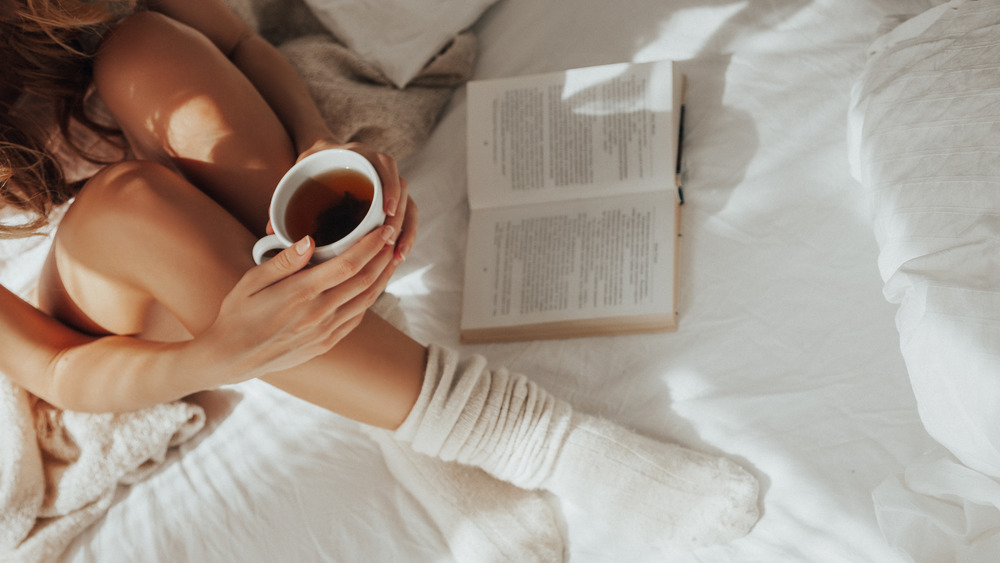
Shutterstock
A spot of tea just might be the secret to making those stubborn eyelids of yours feel heavy. As described by a paper published in Molecular Medicine Reports, chamomile in tea has been utilized as an effective treatment for insomnia for a long time. In fact, it is considered both “a mild tranquilizer and sleep inducer.” The mollifying benefits of this sleepy tea are, in part, a result of a key type of flavonoid that binds to receptors in the brain.
Valerian root tea is another effective option. A study in Pharmacology Biochemistry and Behavior found that those who were given liquid valerian root reported falling asleep quicker and staying asleep longer. While you can find this root in supplement form, you can also get dried tea leaves and brew yourself a warm soothing drink before bed (via Healthline).
Of course, if neither of these options are your cup of tea (get it?), you can try some other sleep-inducing options. According to Healthline, lemon balm, lavender, magnolia, and passionflower are all natural extracts available in tea form that can help alleviate stress, calm your mind, and close your eyes.
Fall asleep with the help of an app
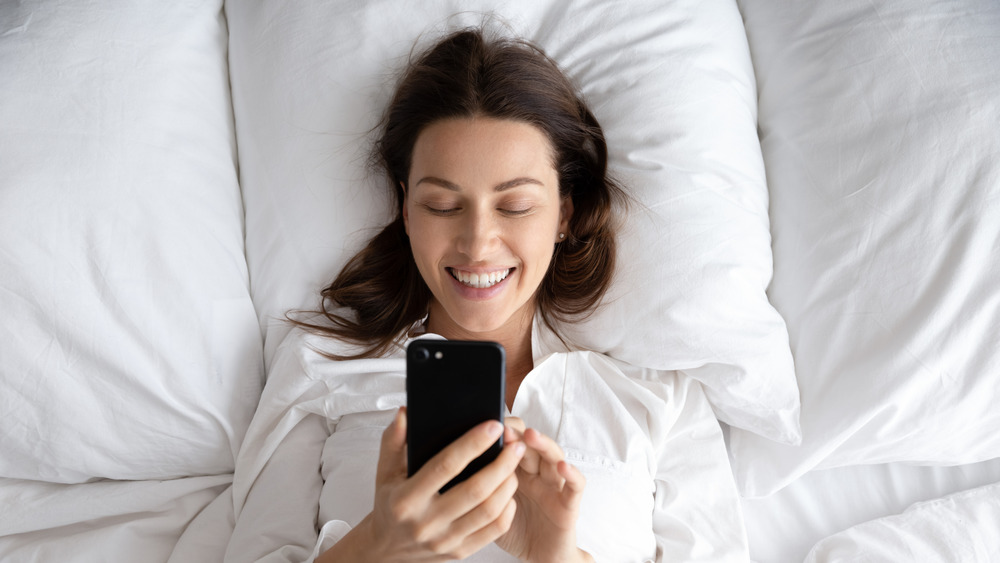
Shutterstock
Most experts advise turning your phone off, or at least setting it aside, once bedtime rolls around. Let’s be clear: The perpetual need to feel connected to work, to friends, and, heck, to strangers on the internet certainly isn’t helping you get to sleep any sooner. What’s more, the lights and sounds of your phone (including sleep-disrupting blue light) keep your brain tuned in and turned on (via SleepFoundation.org).
However, there may be an exception to the bedtime phone-free rule you’ve established at home. Can’t sleep? Download an app — or a whole host of them. Do you want to hear a soothing grown-up bedtime story or be guided through a relaxing meditation or visualization? Try Headspace or Calm. Just looking for soothing sounds? Noisli might do the trick. Finally, if you want to better understand your sleep cycle or get to the root of what’s keeping you up at night, download Sleep Cycle (via Good Housekeeping).
Trick your brain into falling asleep faster

Shutterstock
If you have tried a myriad of ways of falling asleep to no avail, don’t fret just yet. There are other options. One idea might be as easy (and complicated) as tricking your brain. Yes, a little mind game could be the deceptively simple answer you’ve been missing all this time. This technique uses the same concept as reverse psychology, except you’ll be pulling a prank on your own brain.
As explained by the American Psychological Association (APA), “Paradoxical intention is a cognitive technique that consists of persuading a patient to engage in his or her most feared behavior.” But it can also work for insomnia. Instead of desperately trying to get yourself to fall asleep, tell yourself that you don’t want to sleep, you don’t need to sleep, you’re not even remotely tired.
It seems counterintuitive, but “if a patient stops trying to fall asleep and instead stays awake for as long as possible, the performance anxiety is expected to diminish; thus, sleep may occur more easily,” the APA explained. Basically, stop trying so hard and sleep will come. Hopefully.

